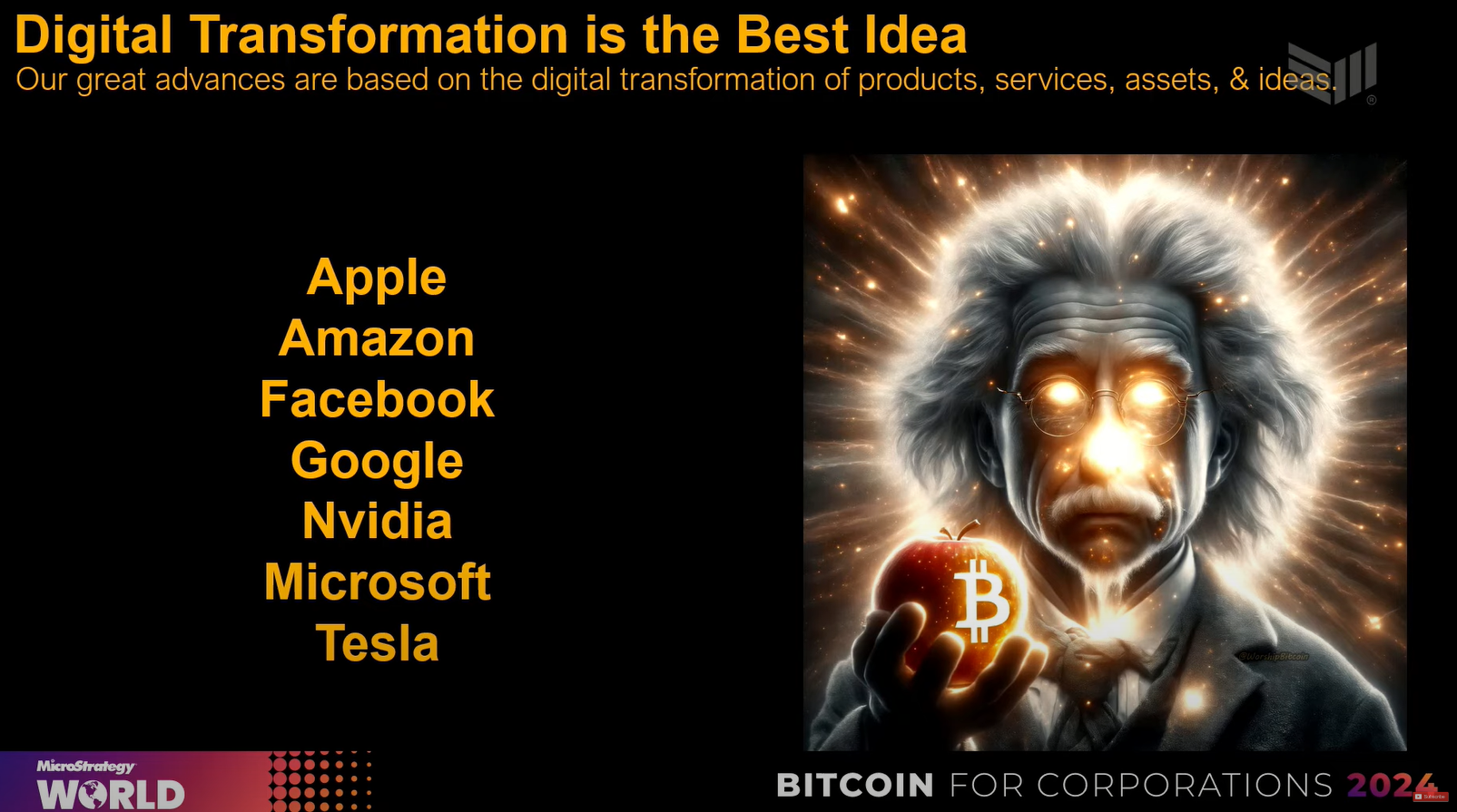21 Rules of Bitcoin: Michael Saylor


The 21 Rules of Bitcoin: A Philosophical Journey
In his BTC Prague 2024 keynote, Michael Saylor frames his conversation by highlighting Bitcoin as a profound intersection where science meets economics. He draws parallels to historical moments where scientific advancements dramatically shifted our understanding of the world, such as the Copernican Revolution in astronomy and the realization that diseases are not caused by demons but by germs in medicine.
Saylor positions Bitcoin as a similarly transformative force, describing it as the world's first perfect money. He contrasts Bitcoin with the defective forms of money humanity has used throughout history, such as seashells, tobacco, glass beads, copper tokens, and paper currencies. He envisions a future where people will look back and chuckle at these primitive forms of money, marveling at how far humanity has come.
Saylor explains that the concept of perfect money is a paradigm shift. He uses the analogy of falling through space to illustrate the idea of relativity, suggesting that everything around us is distorted until we adopt a new frame of reference. Just as Einstein's theory of relativity changed our understanding of physics, Satoshi Nakamoto's invention of Bitcoin introduces a new paradigm in economics and monetary thought. This paradigm shift, according to Saylor, will profoundly change our political systems, financial systems, and overall worldview.
With this philosophical and economic foundation laid, Saylor transitions to presenting his "21 Rules of Bitcoin."
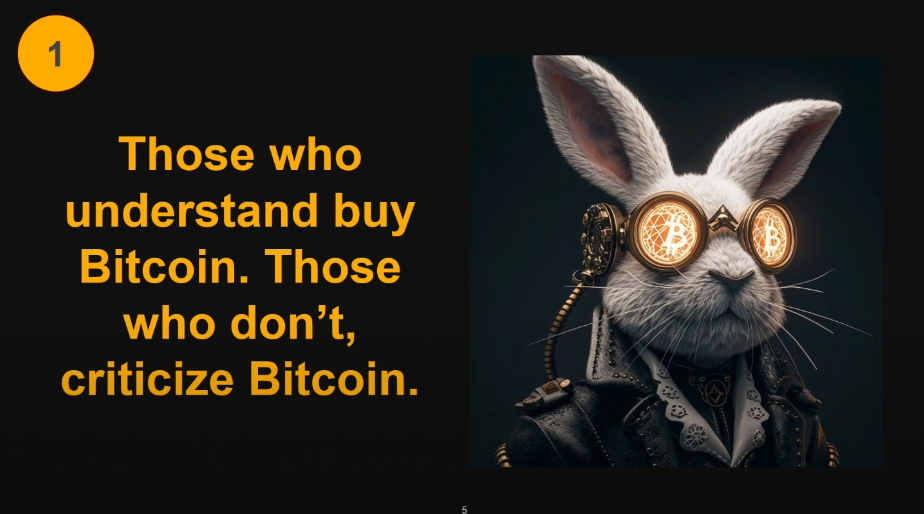
Rule 1: Those Who Understand Bitcoin, Buy Bitcoin. Those who don't criticize Bitcoin.
Imagine you’ve just learned about something truly revolutionary—something that changes the way you see the world. That’s what happens when people truly understand Bitcoin. It’s like a light bulb turning on in their mind.
When you grasp what Bitcoin really is—how it’s a new form of digital money that’s decentralized, secure, and has a limited supply—you realize its enormous potential. You see how it can protect against inflation and offer a safer store of value compared to traditional money. This realization makes you want to act quickly and buy Bitcoin.
On the other hand, people who don’t understand Bitcoin often criticize it. They look at it through old ways of thinking about money and miss its revolutionary essence. They don’t see how it could change the financial world.
When you truly understand Bitcoin, you don’t just talk about it—you buy it. Those who don’t understand it are left questioning and criticizing.
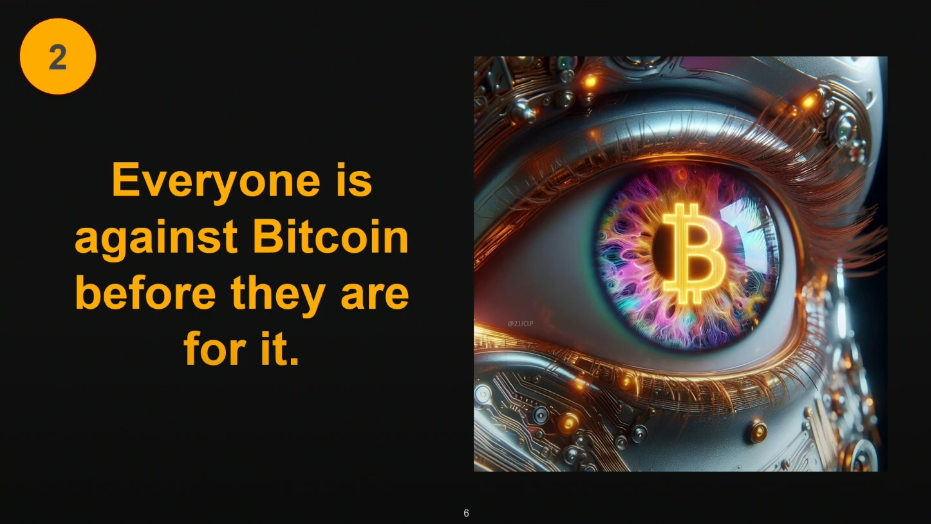
Rule 2: Everybody is Against Bitcoin Before They're For It
When something new and disruptive comes along, it often faces resistance. That's exactly what happens with Bitcoin. At first, banks, politicians, and traditional economists don't like it. They are used to the old ways of doing things and don’t understand Bitcoin yet. This initial opposition is natural because it’s a big change.
But over time, as they learn more about Bitcoin and see its benefits, many of these skeptics change their minds. They start to see its value and potential, and some even become strong supporters. This shows how powerful and convincing Bitcoin can be, even to those who were once its biggest critics.
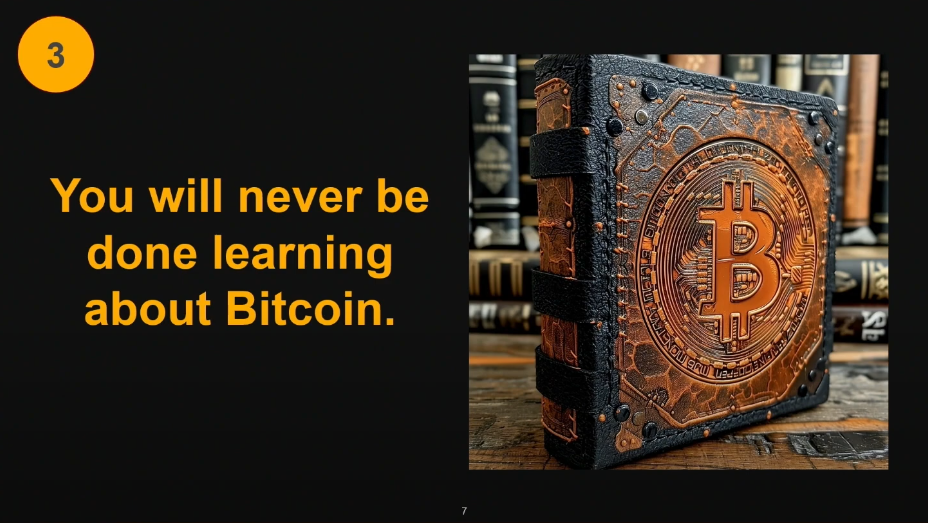
Rule 3: You Never Fully Understand Bitcoin
Understanding Bitcoin is like embarking on a never-ending journey. At first, you might think you’ve grasped its basics—it's digital money, decentralized, and has a limited supply. But the more you learn, the more you realize there's so much more to it.
Bitcoin isn’t just a piece of software or a simple financial tool. It’s a complex, evolving system that intertwines with economics, technology, and society. Think of it like an onion: each layer you peel back reveals another layer underneath. Every new insight you gain about Bitcoin opens up even more questions and areas to explore.
For instance, understanding how Bitcoin works technically is just the beginning. You also need to grasp its economic implications, like how it can protect against inflation or how its decentralized nature makes it secure. Then, there's the impact of Bitcoin on society and how it can empower people in different parts of the world.
Moreover, Bitcoin is constantly evolving. New technologies, applications, and ways of using Bitcoin are being developed all the time. This means that to truly understand Bitcoin, you need to keep learning and stay updated with these developments.
People who genuinely embrace Bitcoin realize that their learning is never complete. They accept that they will always be students of Bitcoin, continuously seeking to understand more about its intricate and dynamic nature. This ongoing learning process is what makes Bitcoin so fascinating and profound.
Rule 3 highlights that understanding Bitcoin is an endless journey. No matter how much you learn, there’s always more to discover. Those who truly grasp this concept embrace continuous learning and stay curious, knowing that they will never fully understand Bitcoin but can always deepen their knowledge and appreciation of it.

Rule 4: Bitcoin is Powered by Chaos
Imagine a world where chaos and uncertainty are constants. Economies fluctuate, governments change policies, and currencies lose value. In such a world, traditional investments—like putting money in a bank, buying stocks, or purchasing property—are all bets on stability. You're essentially trusting that these institutions will remain stable and secure.
But Bitcoin operates differently. It thrives in chaos. When you invest in Bitcoin, you’re not betting on the stability of a country, company, or city. Instead, you’re placing your trust in the decentralized, resilient nature of Bitcoin itself. Bitcoin is like a digital Swiss bank during a time of war. When everything else is falling apart, Bitcoin holds strong because it isn’t controlled by any single entity or susceptible to localized disruptions.
Saylor uses the example of pre-World War II Europe. Imagine you had the chance to invest in any asset within countries about to go to war. Whether it was land, buildings, or businesses, all would have faced enormous risks. However, if you could invest in a Swiss bank that safely stored everyone’s money, you’d have chosen the one investment protected from the chaos. Bitcoin is like that Swiss bank, offering stability and security even when the world around it is in turmoil.
This resilience comes from Bitcoin's decentralized network. No single government or corporation can control it. Its value is derived from its scarcity and the collective trust of millions of users around the world. As traditional systems become more unpredictable, Bitcoin’s strength becomes more apparent.
Bitcoin is powered by chaos because it is designed to withstand and even benefit from instability. When traditional investments falter due to political upheaval, economic crises, or natural disasters, Bitcoin remains a reliable store of value. This makes it a unique and powerful tool for preserving wealth in an uncertain world.

Rule 5: Suit Up for Bitcoin
Imagine you’re about to head into a medieval battle. You wouldn’t want to go in wearing just part of your armor, right? You’d want to be fully suited up, protected from head to toe. The same idea applies when investing in Bitcoin.
To truly benefit from Bitcoin, you need to commit fully. Think of it like putting on a complete suit of armor. Here’s what that means:
- Full Investment: Investing in Bitcoin requires more than just a small, tentative step. It means dedicating a significant portion of your investment funds. If you only dip your toes in, you might miss out on the real benefits and gains that come from a deeper commitment.
- Proper Security: Just like armor protects you in battle, you need to protect your Bitcoin. This means using secure wallets and keeping your private keys safe. If you’re careless with your security, you could lose everything. Think of your private keys as the shield that keeps your investment safe from hackers and scams.
- Understanding Risks: Before heading into battle, you’d want to know what you’re up against. With Bitcoin, it’s crucial to understand that its value can go up and down a lot. Being aware of this volatility helps you stay calm during market fluctuations and make smarter decisions.
- Integrating Bitcoin Fully: To truly suit up, you need to make Bitcoin a part of your overall financial plan. This might mean using it as a way to protect your money from inflation or as a long-term investment. It’s about seeing Bitcoin as a key part of your financial strategy, not just a side bet.
- Avoiding Half-Hearted Efforts: If you only partially invest in Bitcoin, you’re like a knight going into battle without full armor. You’re vulnerable and might miss out on the best opportunities. A small investment might not be enough to make a significant impact, especially if your other investments don’t perform well.
Suiting up for Bitcoin means going all in. You need to commit fully, secure your investment, understand the risks, and make Bitcoin a central part of your financial strategy. Just like a knight in full armor is ready for battle, you need to be fully prepared to navigate the world of Bitcoin. Those who do are best positioned to reap the rewards and protect themselves against potential losses.
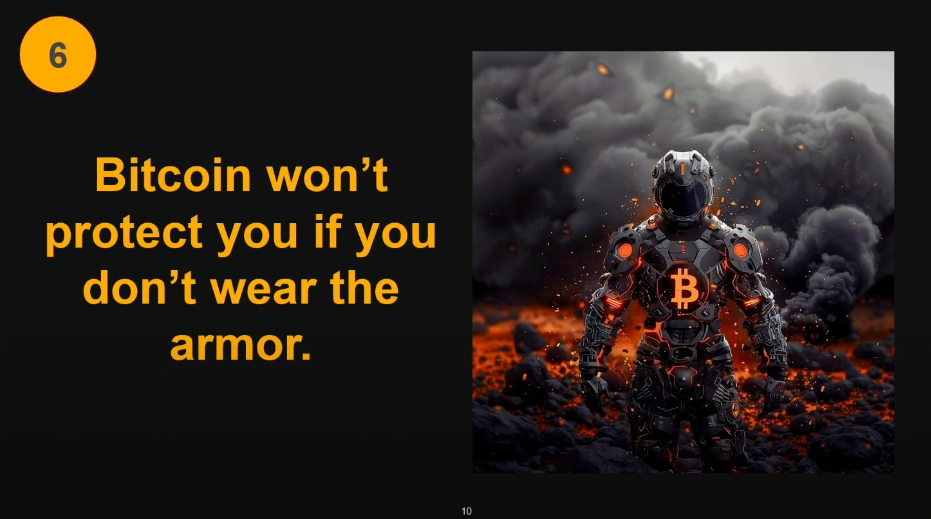
Rule 6: Bitcoin won't protect you if you don't wear the armor.
Imagine a game where everyone, no matter who they are or where they come from, has a fair shot at winning. This is what Bitcoin offers—a unique opportunity in the world of finance that’s different from anything we’ve seen before.
In traditional financial systems, think of it like a poker game. For every winner, there are many losers. If someone makes money, it usually means someone else lost money. This creates a zero-sum game where gains and losses balance out, often leading to inequality and exclusion. Not everyone can come out ahead.
Bitcoin, however, changes this dynamic completely. Here’s how:
- Open and Fair System:
- Decentralization: Bitcoin isn’t controlled by any single person, government, or corporation. It’s decentralized, meaning it operates on a network of computers all over the world. This setup ensures that no one can manipulate the system to their advantage.
- Equal Opportunity: Because Bitcoin is decentralized, everyone has an equal opportunity to participate. There are no gatekeepers deciding who can join or benefit from Bitcoin. All you need is an internet connection.
- Universal Access:
- Inclusivity: Traditional financial systems can exclude people based on where they live, how much money they have, or other factors. Bitcoin, however, is accessible to anyone, anywhere. Whether you’re in a bustling city or a remote village, you can use Bitcoin.
- No Barriers: Unlike banks that might require paperwork and have strict criteria, Bitcoin is open to anyone who wants to join. This inclusivity helps break down barriers to financial participation.
- Shared Prosperity:
- Collective Growth: In Bitcoin, success isn’t limited to a few individuals or entities. As more people join and use Bitcoin, the network becomes stronger and more valuable for everyone involved. It’s a system designed for everyone to benefit together.
- Network Effect: The more people who use Bitcoin, the more valuable it becomes. This means that everyone who participates can see their investment grow over time, creating a win-win situation.
- Borderless Value:
- Global Reach: Bitcoin isn’t tied to any one country or economy. It operates on a global scale, making it a universal financial network. This allows for easy and seamless transactions across borders, fostering international economic inclusion.
- Freedom from Constraints: Traditional currencies and financial systems are often restricted by national borders and regulations. Bitcoin transcends these limitations, providing a truly global financial system.
- Long-Term Benefits:
- Future Potential: Bitcoin offers the potential for long-term growth. Those who invest and hold Bitcoin stand to benefit as the network grows and evolves. This potential for growth isn’t reserved for a select few but is available to all participants.
- Security and Stability: The decentralized nature of Bitcoin provides security against manipulation and fraud, ensuring that the benefits are fairly distributed among all users.
Bitcoin is a financial game where everyone can win. It breaks away from the traditional zero-sum game of financial markets, providing an open, fair, and inclusive system. By enabling universal access and shared prosperity, Bitcoin creates opportunities for widespread participation and long-term benefits for everyone involved. It’s a new way of thinking about money and value that has the potential to transform the financial landscape.

Rule 7: Bitcoin is the one thing in the universe that you can truly own
Imagine having something that no one can take away from you, no matter what. This is the unique promise of Bitcoin. It offers a level of ownership that is different from anything we’ve known before.
True Ownership:
Controlled by Cryptographic Keys: Think of Bitcoin as a digital vault that only you can open. This vault is secured by a complex password, known as a cryptographic key, that only you know. If you have this key, you own the Bitcoin. No one else can access it without your permission.
No Middlemen: Unlike traditional assets, where banks or governments keep track of what you own, Bitcoin ownership doesn’t rely on any third parties. It’s just you and your keys. You don’t need anyone else to validate or manage your ownership.
Security and Autonomy:
Unseizable Asset: Traditional assets, like money in a bank, property, or investments, can be taken away by authorities or devalued by economic changes. Bitcoin is different. As long as you control your keys, no one can seize your Bitcoin. Not a government, not a bank—no one.
Protected Value: Bitcoin’s value isn’t subject to inflation in the same way traditional currencies are. Only 21 million bitcoins will ever exist, which means it can’t be inflated away by creating more. This scarcity helps protect its value over time.
Redefining Property in the Digital Age:
Digital Ownership: In the past, ownership was tied to physical items like land, gold, or cash. Bitcoin changes this by creating a form of ownership that exists purely in the digital world. Despite being digital, this ownership is very real and secure.
Global Accessibility: Bitcoin isn’t tied to any country or legal system. It’s a global asset, which means you can own and use it no matter where you are. This borderless nature makes it a unique and flexible form of property.
Decentralized Assurance:
Resilient Network: Bitcoin operates on a decentralized network of computers spread all over the world. This means there’s no central point of failure. No single entity can control or undermine the entire Bitcoin network.
Trustless System: You don’t have to trust a central authority or institution to secure your Bitcoin. The system is based on cryptographic principles and the consensus of the network participants, making it a robust and reliable form of ownership.
Bitcoin is the one thing you can truly own in the digital age. Its ownership is secured by cryptographic keys that only you control, ensuring that no one can seize or devalue it. This provides a level of security and autonomy that traditional assets can’t match. Bitcoin redefines what it means to own something, offering a powerful new form of property that is global, secure, and entirely under your control.
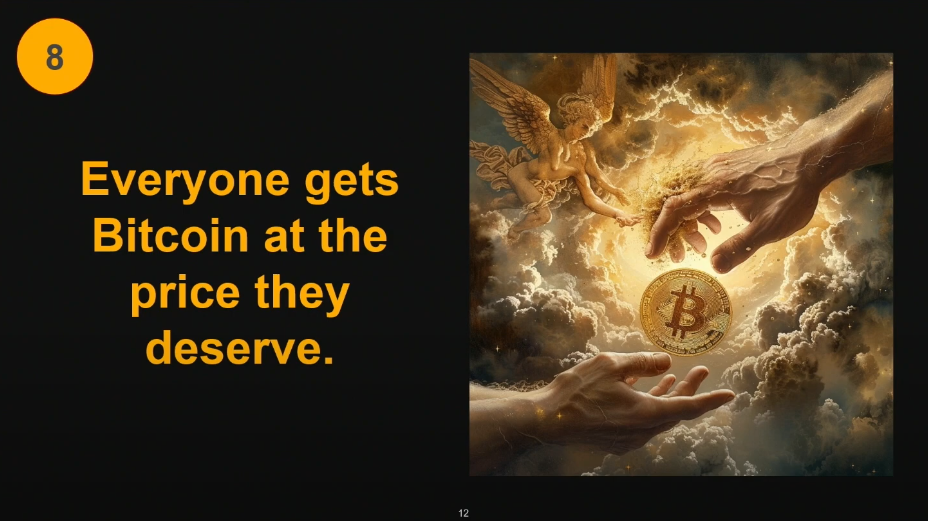
Rule 8: Everybody Gets Bitcoin at the Price They Deserve
Imagine you’re on a journey to discover a hidden treasure. The sooner you realize its value and set out to find it, the less you have to pay to claim it. This is what buying Bitcoin is like—a personal journey where timing and understanding play crucial roles.
Personal Journey:
Early Recognition: Think of those who saw Bitcoin’s potential early on. They understood what a groundbreaking innovation it was before most people did. Because of their early insight, they were able to buy Bitcoin when it was much cheaper. It’s like finding the treasure map before anyone else.
Later Realization: Now, imagine others who only learn about the treasure later. By the time they start their journey, the treasure is more widely known, and many have already claimed their share. These latecomers have to pay a higher price to get their piece of Bitcoin. It’s not a punishment but a natural result of the increased demand.
Adoption Dynamics:
Early Insight and Courage: The early adopters had the courage to take a chance on something new and uncertain. Their reward for this bravery and understanding is getting Bitcoin at lower prices. They saw the value before it became obvious to everyone else.
Rising Demand: As more people learn about Bitcoin and understand its value, more people want to buy it. This increased demand naturally drives up the price. It’s similar to how the value of a rare item increases as more people recognize its worth.
Importance of Education:
Learning and Understanding: Those who take the time to educate themselves about Bitcoin are better prepared to recognize its potential. They understand the technology, the benefits, and the future possibilities.
Timely Action: But understanding alone isn’t enough. Acting on that knowledge is crucial. The timing of your decision to buy Bitcoin reflects your readiness to embrace its potential. The earlier you act, the better the price you get.
Reflection of Timing:
Price as a Reflection: The price you pay for Bitcoin when you buy it reflects your journey. Early adopters who understood its value and acted on it quickly got in at lower prices. Those who took longer to understand and act had to pay more.
Journey’s Reward: This system rewards those who are early and proactive. It highlights the benefits of being informed and decisive when faced with new opportunities.
Everybody gets Bitcoin at the price they deserve. This means that the price you pay for Bitcoin is a reflection of how early you recognized its value and decided to act on that understanding. It emphasizes the importance of educating yourself, understanding the potential of new technologies, and being ready to seize opportunities when they arise. Your journey and timing determine the price you pay, rewarding those who are ahead of the curve.
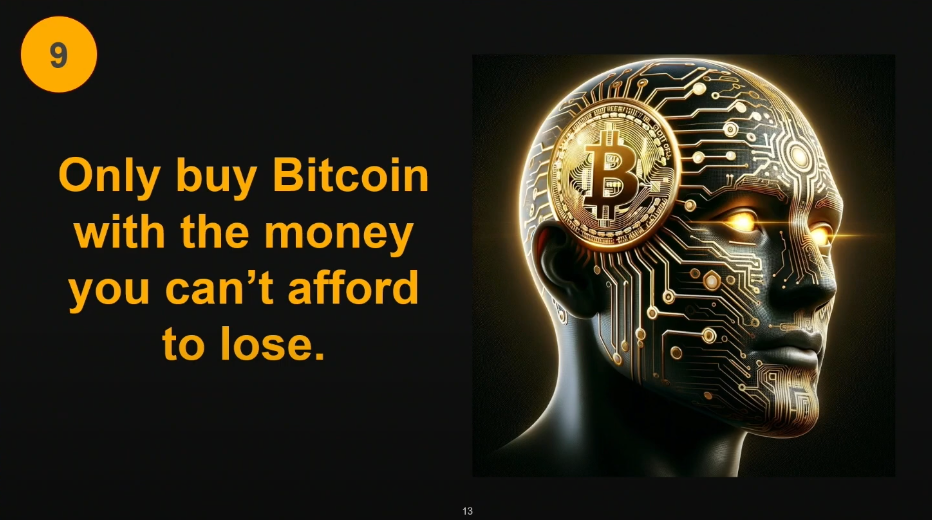
Rule 9: Only Buy Bitcoin with Money You Can’t Afford to Lose
Imagine you’re thinking about investing in something new and exciting, like Bitcoin. There’s a golden rule to keep in mind: only use money that you can afford to lose. This means that you should not invest your rent money, your emergency savings, or any funds that you need for your basic necessities. Here’s why this rule is important:
- Understanding Risk:
- Volatility: Bitcoin is known for its price volatility. Its value can go up and down significantly in a short period. This means there’s a chance you could lose money if you need to sell during a downturn.
- Investment Nature: Like any investment, Bitcoin carries risks. It’s important to be aware that while it has the potential for high returns, it also comes with the possibility of losses.
- Financial Safety:
- Prioritizing Essentials: Ensure that your essential needs—such as housing, food, healthcare, and emergency funds—are covered before you invest in Bitcoin. This helps protect you from financial hardship if your investment doesn’t perform as expected.
- Peace of Mind: Using only the money you can afford to lose reduces financial stress. If your investment decreases in value, it won’t impact your ability to meet your essential financial obligations.
- Long-Term Perspective:
- Patience and Resilience: Investing money you can afford to lose allows you to be patient and resilient during market fluctuations. You won’t feel pressured to sell during a downturn, giving your investment time to recover and potentially grow.
- Strategic Investment: This approach encourages strategic, long-term thinking. You’re more likely to make sound decisions and avoid impulsive reactions to short-term market changes.
- Responsible Investing:
- Informed Decisions: Invest in Bitcoin because you believe in its long-term potential, not because you’re looking for a quick win. Do your research and understand what you’re investing in.
- Balanced Portfolio: Consider Bitcoin as part of a diversified investment portfolio. Don’t put all your money into one asset. Diversification helps manage risk and can lead to more stable overall returns.
Only buy Bitcoin with money you can afford to lose. This means using funds that you don’t need for essential expenses and can afford to risk. By following this rule, you protect yourself from financial hardship, reduce stress, and can take a long-term, strategic approach to your investment.
Remember, responsible investing is key to making informed and sound financial decisions.
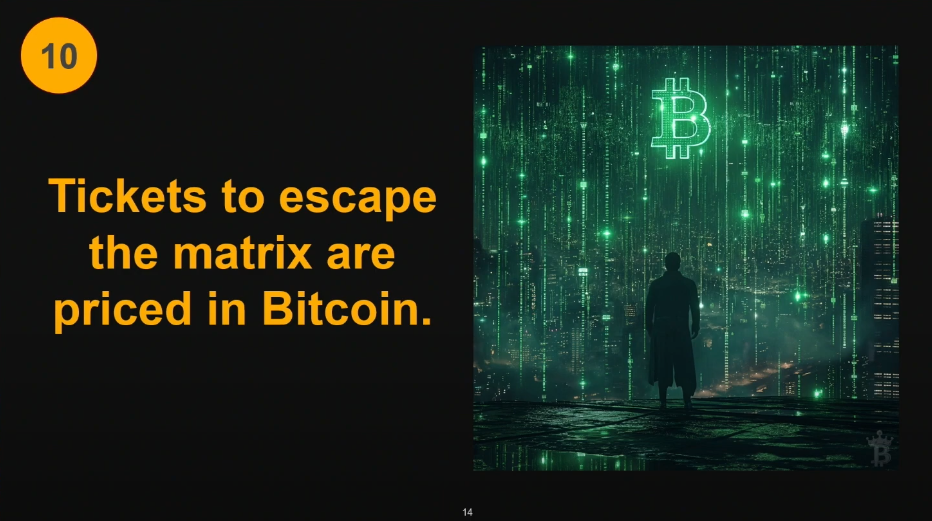
Rule 10: Tickets to Escape the Matrix are priced in Bitcoin
Imagine living in a world where everything is controlled and manipulated by powerful forces. Prices go up, your savings lose value, and financial decisions are made by a few at the top. This is the financial "Matrix" we live in today. Bitcoin offers a way out—a ticket to escape this controlled environment.
Understanding the Matrix:
Controlled Financial Systems: In our current financial system, governments and banks control money. They can print more money, causing inflation, and manipulate interest rates, which affects your savings and investments.
Economic Manipulation: Traditional financial systems are often manipulated to benefit a small group of people. This leaves the average person with little control over their financial future.
Bitcoin as an Escape:
Decentralized Money: Bitcoin is decentralized, meaning no single entity controls it. This removes the power from governments and banks to manipulate your money.
Fixed Supply: There will only ever be 21 million bitcoins, which makes it resistant to inflation. Your savings in Bitcoin are protected from being devalued by money printing.
Financial Freedom:
Personal Control: With Bitcoin, you have full control over your money. You can send and receive it without needing permission from a bank or government.
Security and Stability: Bitcoin’s technology ensures that your money is secure and its value is stable over the long term, providing a safe haven from the fluctuations and manipulations of traditional currencies.
A Better Financial Future:
Independence: Holding Bitcoin means you are less dependent on traditional financial systems that are prone to corruption and manipulation. It empowers you to manage your finances independently.
Global Participation: Bitcoin is a global currency that anyone can use, regardless of where they live. This inclusivity promotes financial equality and provides opportunities for people who are excluded from traditional banking.
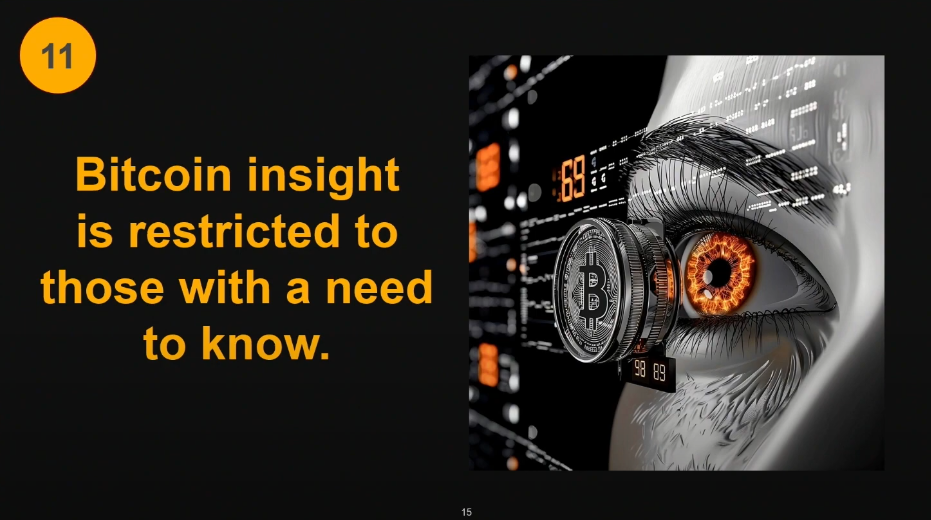
Rule 11: Bitcoin Insight is Restricted to Those with a Need to Know
Imagine you're walking through a dark forest, unable to see the path ahead. Suddenly, a light appears, showing you the way. This light is Bitcoin insight, and it often only comes to those who truly need it. When you’re comfortable and everything seems fine, you might not see why Bitcoin is important. But in times of crisis or when faced with financial challenges, the need to understand Bitcoin becomes clear.
- Understanding Through Necessity:
- Comfort and Complacency: When life is comfortable, and the traditional financial system seems to work for you, it’s easy to ignore Bitcoin. There’s no pressing need to explore or understand it.
- Crisis as a Catalyst: Often, a financial crisis or personal economic hardship acts as a catalyst for understanding Bitcoin. When traditional systems fail or you face significant financial challenges, the importance and potential of Bitcoin become apparent.
- Bitcoin's True Value:
- Revealed in Hard Times: During financial instability, people start looking for alternatives that are more secure and reliable. Bitcoin’s decentralized nature, fixed supply, and resistance to manipulation become more attractive.
- A Lifeline in Crisis: For those in countries with hyperinflation, corrupt governments, or unstable economies, Bitcoin provides a lifeline. It offers a way to preserve value and maintain financial independence.
- Learning and Understanding:
- Continuous Learning: Even those who initially understand Bitcoin find that it’s a continuous learning journey. The more you learn, the more you realize there’s still more to understand. This ongoing education is part of what makes Bitcoin so fascinating and valuable.
- Embracing Humility: Realizing that you’ll never fully understand Bitcoin encourages humility and a thirst for knowledge. It keeps you engaged and open to new insights and developments.

Rule 12: All Your Models Will Be Destroyed
Imagine you’ve spent years building a detailed model of how the world works, using it to make important decisions. Then, a new discovery renders your model obsolete, forcing you to rethink everything. This is what Bitcoin does to traditional financial and economic models—it fundamentally changes the game.
- Challenging Traditional Models:
- Outdated Assumptions: Traditional financial models are based on assumptions that have held true for decades, such as centralized control of money, inflationary currencies, and the role of banks and governments. Bitcoin disrupts these assumptions.
- Decentralization and Fixed Supply: Bitcoin’s decentralized nature and fixed supply challenge the idea that central authorities are needed to manage money. These characteristics require new models that can accommodate Bitcoin’s unique properties.
- Rethinking Economics:
- New Economic Principles: Bitcoin introduces principles that are fundamentally different from traditional economics. For example, its deflationary nature (due to limited supply) contrasts sharply with the inflationary nature of fiat currencies.
- Global and Inclusive: Bitcoin operates on a global scale, accessible to anyone with an internet connection. This inclusivity challenges models that are based on national borders and restricted access to financial systems.
- Adapting to Change:
- Continuous Learning: Embracing Bitcoin means being open to continuous learning and adapting to new information. Old models will be destroyed, but this opens the door to innovative approaches and solutions.
- Innovative Thinking: To fully understand and benefit from Bitcoin, you need to think outside the box. This involves letting go of outdated concepts and being willing to explore new ideas.

Rule 13: The Cure to Economic Ill is the Orange Pill
Imagine you’ve been taking medicine that isn’t working, and you continue to feel worse over time. This is what our current financial system is like for many people—full of problems like inflation, debt, and economic inequality. Bitcoin, often referred to as the "orange pill," offers a new solution to these problems.
- Fighting Inflation:
- Limited Supply: Unlike traditional money, which governments can print in unlimited amounts, Bitcoin has a fixed supply of 21 million coins. This scarcity helps protect against inflation, which erodes the value of money over time.
- Stable Value: By holding Bitcoin, you can protect your savings from losing value due to inflation. Bitcoin’s limited supply means it tends to hold its value better than traditional currencies.
- Reducing Economic Inequality:
- Decentralized System: Bitcoin operates on a decentralized network, meaning no single entity controls it. This reduces the power of banks and governments to manipulate the financial system for their own benefit.
- Financial Inclusion: Bitcoin provides access to financial services for people who are excluded from traditional banking systems. This promotes economic equality by allowing everyone to participate in the global economy.
- Providing Financial Stability:
- Transparent Transactions: All Bitcoin transactions are recorded on a public ledger, making the system transparent and reducing the risk of corruption.
- Secure and Independent: Bitcoin’s technology ensures that your money is secure and independent of any central authority. This provides a safe haven from the financial instability often seen in traditional systems.
- A Healthier Economic System:
- New Economic Principles: Bitcoin introduces principles that are fundamentally different from traditional economics. Its deflationary nature (due to limited supply) contrasts sharply with the inflationary nature of fiat currencies.
- Global and Inclusive: Bitcoin operates on a global scale, accessible to anyone with an internet connection. This inclusivity challenges models that are based on national borders and restricted access to financial systems.
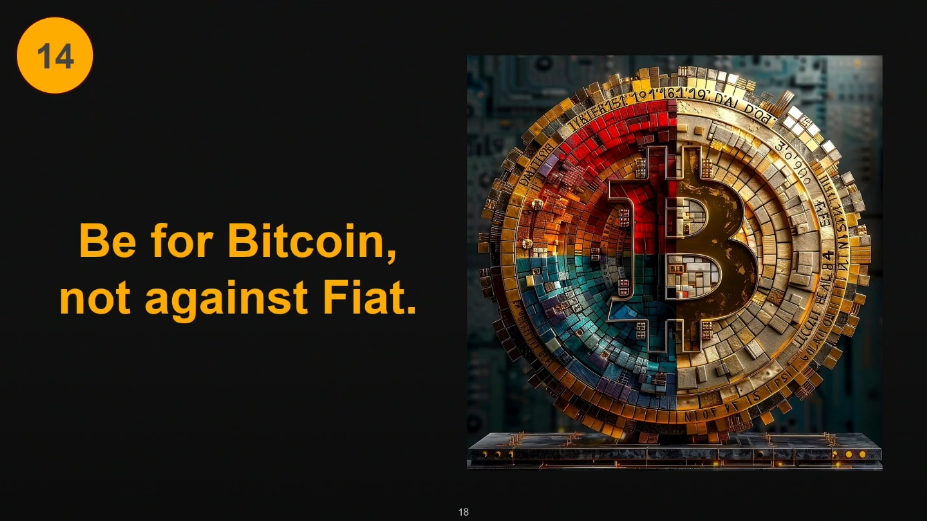
Rule 14: Be for Bitcoin, Not Against Fiat
This rule emphasizes the importance of advocating for Bitcoin without denigrating traditional fiat currencies. Here's a simple breakdown:
- Positive Advocacy: Focus on the benefits and strengths of Bitcoin, rather than criticizing fiat currencies. Highlight how Bitcoin can enhance financial systems and personal wealth.
- Recognition of Usage: Understand that fiat currencies are still widely used and accepted. Many wealthy individuals and businesses price their goods and services in fiat currencies, acknowledging their practical use in daily transactions.
- Inclusivity: By being positive about Bitcoin without being antagonistic toward fiat, you make Bitcoin more appealing to a broader audience. This inclusive approach can encourage more people to explore and adopt Bitcoin.
- Long-term Vision: Realize that most of the world’s wealth is currently held in assets other than fiat currencies, and a significant portion can eventually transition to Bitcoin. Promoting Bitcoin should be about presenting it as a valuable option, not about rejecting existing financial systems outright.
In summary, advocate for Bitcoin by showcasing its strengths and potential, while still respecting the current role of fiat currencies in the global economy. This approach can help in gaining wider acceptance and support for Bitcoin.
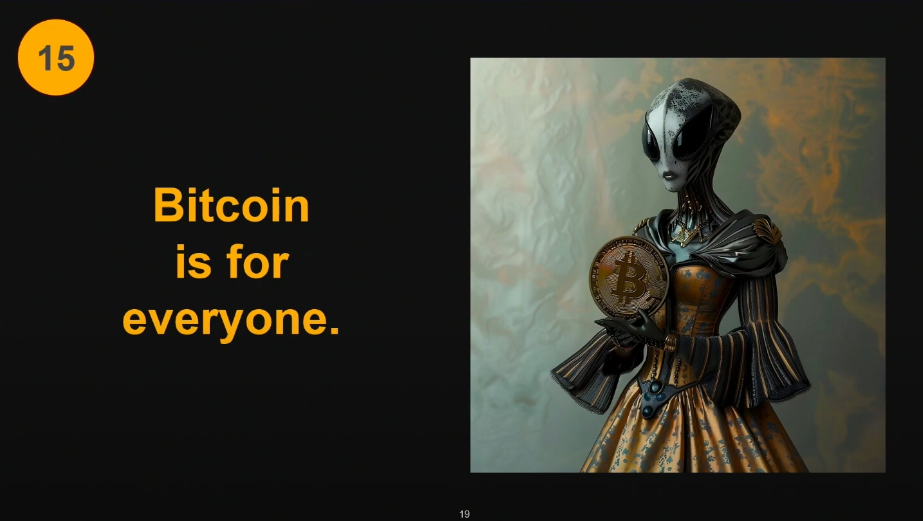
Rule 15: Bitcoin is for Everyone
This rule highlights the universal accessibility and inclusivity of Bitcoin. Here’s a straightforward explanation:
- No Discrimination: Bitcoin is open to everyone, regardless of background, nationality, or financial status. It doesn't matter who you are or where you come from; anyone can use Bitcoin.
- Global Reach: Whether you are a friend, a competitor, or even an adversary, Bitcoin remains accessible. The technology and its benefits are available to all, promoting financial inclusion worldwide.
- Economic Impact: Even those you might not like or agree with can use Bitcoin. This includes entities like AI bots or corporations that you may feel have negatively impacted your life. Their involvement in Bitcoin can drive up its value, indirectly benefiting you as a Bitcoin holder.
- Inclusivity of Different Groups: Different people and organizations, regardless of their ideologies or origins, contribute to the Bitcoin ecosystem. This diversity strengthens the network and increases its value.
In essence, Bitcoin's design is inherently inclusive, making it a financial tool that anyone can access and benefit from, promoting a more inclusive and interconnected global economy.
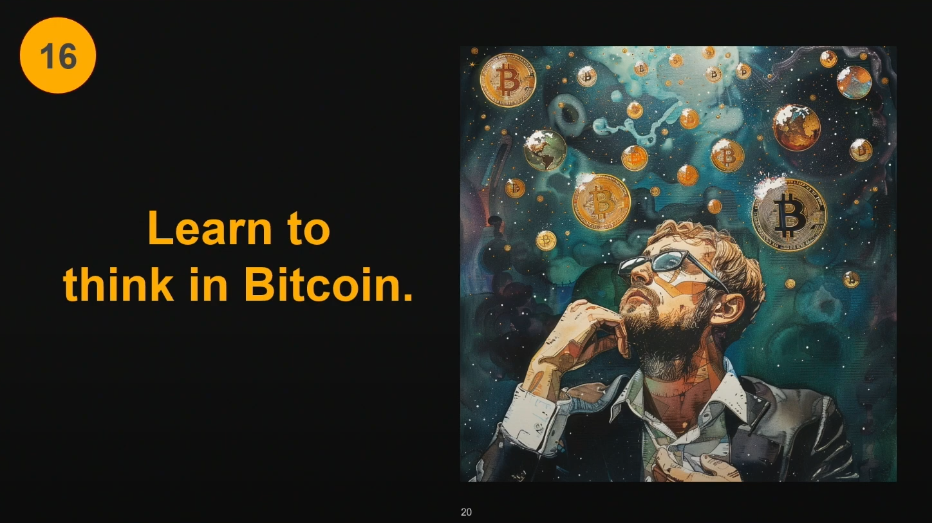
Rule 16: Learn to Think in Bitcoin
Imagine you’ve been using one type of measurement your whole life, like feet and inches, and now you’re learning to use a completely different system, like meters and centimeters. This change in how you measure things can alter your perspective and understanding. Learning to think in Bitcoin is similar—it’s about changing how you view and measure value in the financial world.
Understanding Bitcoin’s Impact:
Fundamental Shift: Bitcoin isn’t just another currency; it’s a fundamentally different way of thinking about money. Traditional money, like dollars or euros, can be printed endlessly, leading to inflation. Bitcoin, on the other hand, has a fixed supply of 21 million coins. This scarcity gives it unique value and stability over time.
Valuing Assets:
New Measurement: When you start thinking in Bitcoin, you measure the value of things in terms of Bitcoin rather than traditional money. For example, instead of asking how much a car costs in dollars, you consider its price in Bitcoin. This helps you see the true value of assets based on Bitcoin’s stable supply.
Assessing Returns and Risks:
Investment Returns: Evaluating how much an investment has grown in Bitcoin terms can provide a clearer picture of its performance. An investment might look good in dollars, but if Bitcoin’s value has increased more, the investment might not be as great when measured in Bitcoin.
Risk Assessment: Traditional investments might seem safe, but when you think in Bitcoin, you realize that the real risk might be sticking with fiat currencies that lose value over time due to inflation.
Avoiding Fiat Pitfalls:
Inflation Awareness: Traditional money loses value over time because of inflation. Thinking in Bitcoin helps you avoid this pitfall because Bitcoin’s fixed supply protects it from inflation. Your savings in Bitcoin are less likely to lose value over time.
Breaking Free from Old Habits: Shifting your mindset away from traditional currencies helps you break free from old habits and biases. It allows you to see new opportunities and make better financial decisions based on Bitcoin’s strengths.
Aligning Financial Strategies:
Strategic Planning: By thinking in Bitcoin, you align your financial strategies with Bitcoin’s unique properties. This means considering how Bitcoin can be part of your long-term savings and investments, and understanding its benefits over traditional money.
Maximizing Benefits: This new way of thinking enables you to make the most of Bitcoin’s advantages. You become better at navigating the Bitcoin ecosystem, making informed decisions, and leveraging Bitcoin’s strengths to improve your financial well-being.
Appreciating Bitcoin’s Potential:
Deeper Understanding: Thinking in Bitcoin helps you understand why it’s valuable and how it can protect your wealth. You appreciate the benefits it offers over traditional financial systems.
Effective Use: This understanding leads to more effective use of Bitcoin. Whether you’re investing, saving, or making transactions, thinking in Bitcoin ensures you’re maximizing its benefits.
Learning to think in Bitcoin means changing how you measure and understand value in the financial world. It’s about seeing the true worth of assets, assessing returns and risks accurately, and avoiding the pitfalls of traditional money. By thinking in Bitcoin, you can better appreciate its potential, make smarter financial decisions, and fully benefit from its unique properties.
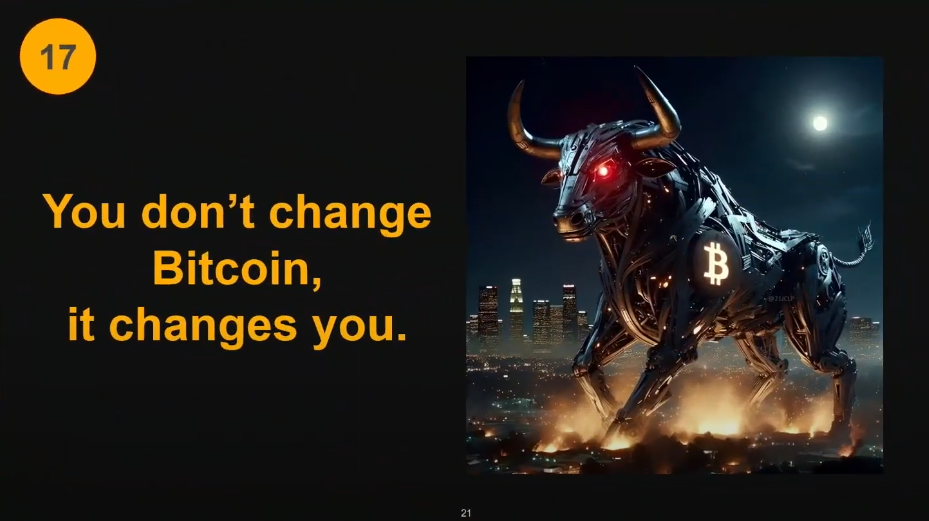
Rule 17: You Don't Change Bitcoin, It changes you.
Imagine a grand, ancient fortress that has stood the test of time. Its walls are unyielding, built to withstand any force that tries to alter them. This is what Bitcoin is like—a strong and stable system that doesn't change easily. Understanding this is key to working with Bitcoin effectively.
Stability and Resistance to Change:
Built to Last: Bitcoin was designed with a set of core principles that make it stable and reliable. These principles include its decentralized nature, fixed supply, and secure network. This stability is why people trust and rely on Bitcoin.
Decentralized Control:
Unlike traditional financial systems that can be changed by governments or banks, Bitcoin operates on a decentralized network. This means no single person or group can make changes to Bitcoin. Any changes require agreement from the majority of the network, making it very hard to change anything fundamental about Bitcoin.
Immutability as a Feature:
Security and Integrity: The fact that Bitcoin doesn’t change easily is a feature, not a flaw. This immutability is what makes Bitcoin secure and trustworthy. Once a transaction is recorded, it can’t be altered, which ensures the network’s integrity.
Predictable Rules:
Bitcoin’s resistance to change means that its rules are predictable. Investors and users know what to expect, which helps them plan for the long term without worrying about sudden changes.
Aligning with Bitcoin’s Trajectory:
Understanding Bitcoin: To succeed with Bitcoin, you need to understand how it works and why it’s designed the way it is. Trying to change Bitcoin to fit traditional financial models or expectations will only lead to frustration. Instead, learn why Bitcoin’s stability and resistance to change are valuable.
Long-Term Strategy:
Align your strategies with Bitcoin’s long-term nature. Recognize its strengths, such as its protection against inflation and its decentralized control, and use these to your advantage.
Adapting to Bitcoin:
Embrace the Rules: Bitcoin has its own set of rules that are designed to make it successful. Embrace these rules instead of trying to change them. This means understanding and appreciating the importance of decentralization, security, and a fixed supply.
Innovate Within the System:
While you can’t change Bitcoin’s core principles, there’s plenty of room for innovation within its framework. Develop new applications and services that work with Bitcoin’s existing structure rather than trying to alter it.
You don’t change Bitcoin. Its strength comes from its stability and resistance to change, which ensures its security and reliability. By understanding and embracing Bitcoin’s core principles, you can align your strategies with its long-term nature and take advantage of its unique strengths. Adapting to Bitcoin and innovating within its framework will help you make the most of what it has to offer.

Rule 18: Laser Eyes Protect You from Endless Lies
This rule uses the metaphor of "laser eyes" to represent focus and commitment to Bitcoin, helping to shield you from distractions and misinformation. Here’s a simple explanation:
- Stay Focused: "Laser eyes" symbolize maintaining a clear and unwavering focus on Bitcoin. By keeping this focus, you are less likely to be swayed by misleading information or false promises from other investments or financial systems.
- Avoid Distractions: In the world of finance, there are many distractions and tempting offers that can lead you astray. The concept of laser eyes encourages you to stay dedicated to Bitcoin and not get distracted by these potentially deceptive opportunities.
- Misinformation Shield: There is a lot of misinformation and skepticism about Bitcoin. Having "laser eyes" means being resilient against these doubts and sticking to your belief in the value and potential of Bitcoin.
- Long-term Vision: The idea of laser eyes also emphasizes having a long-term vision for Bitcoin. Instead of getting caught up in short-term fluctuations or fears, you stay focused on the bigger picture and the future potential of Bitcoin.
"laser eyes" remind you to stay focused, avoid distractions, and not be misled by misinformation, ensuring that you remain committed to the long-term benefits of Bitcoin.
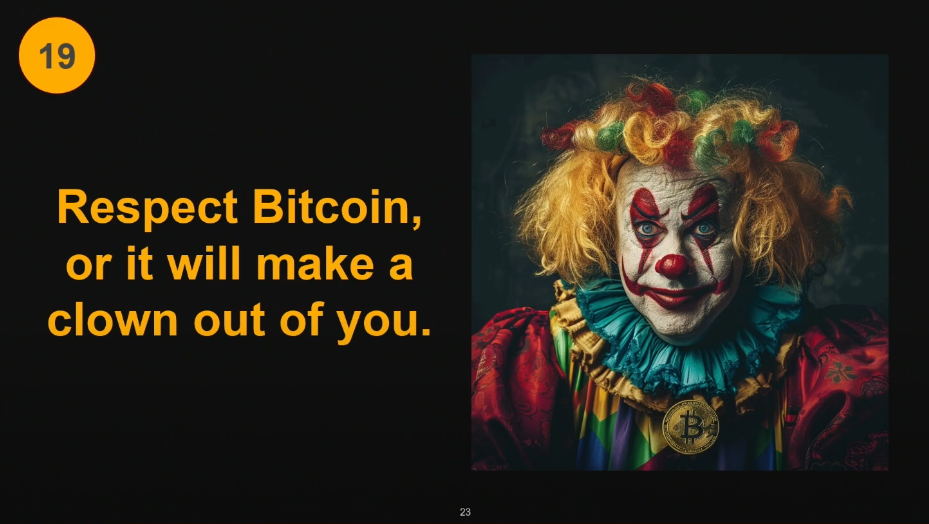
Rule 19: Respect Bitcoin, or It Will Make a Clown Out of You
This rule emphasizes the importance of understanding and respecting Bitcoin's unique characteristics. Here’s a simple explanation:
- Serious Commitment: Bitcoin is a revolutionary technology and financial system. It requires serious commitment and understanding. If you treat it lightly or dismiss it, you might end up making poor decisions.
- Avoid Overconfidence: Don’t assume you know everything about Bitcoin or think you can easily manipulate it. Overconfidence can lead to mistakes that could be costly, both financially and reputationally.
- Learn Continuously: Bitcoin is complex and constantly evolving. To succeed, you need to continuously learn and adapt. Ignoring this need for ongoing education can leave you behind.
- Market Reality: The Bitcoin market can be unforgiving. If you don’t take it seriously, you can suffer significant losses or miss out on opportunities, making you look foolish.
In essence, take Bitcoin seriously, respect its potential and complexity, and avoid the pitfalls of overconfidence and complacency to avoid making costly errors.
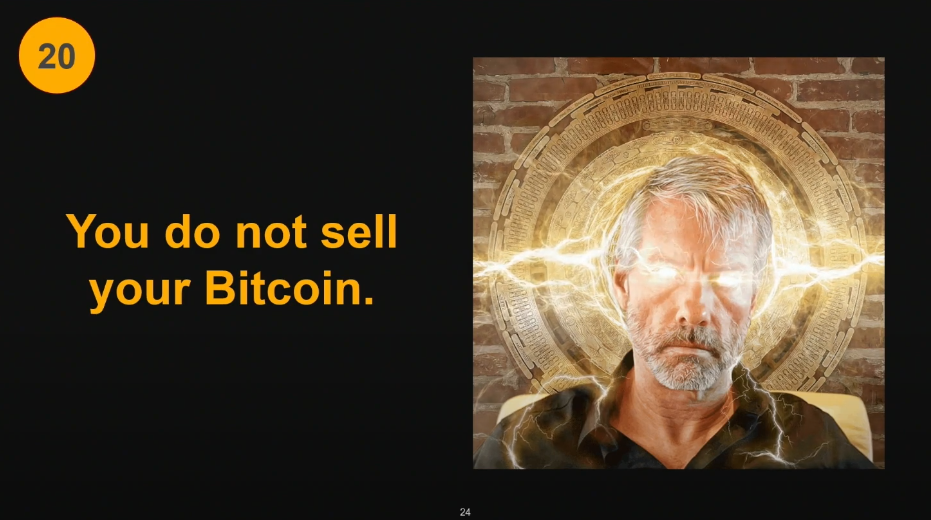
Rule 20: You do not sell your Bitcoin, Everyone Wants Your Bitcoin.
Imagine you have a rare and valuable treasure that everyone else wishes they owned. This treasure is so precious that powerful entities like banks, governments, and large corporations all want to convince you to give it up. This is what holding Bitcoin is like.
Who Wants Your Bitcoin?:
Banks and Financial Institutions: Traditional banks and financial institutions rely on the current financial system to make money and maintain control. Bitcoin, which operates outside their control, threatens this system. Banks would prefer you to sell your Bitcoin and keep your money within their system where they can profit from it.
Governments: Governments manage and regulate national currencies and the financial systems around them. Bitcoin challenges their ability to control money because it operates independently of any government. Some governments may try to persuade or pressure you to sell your Bitcoin to maintain their control over financial systems.
Corporations: Large companies, especially those in finance, may view Bitcoin as a disruptive force. These corporations benefit from the status quo and may encourage you to sell your Bitcoin to prevent this disruption.
Understanding the Pressure:
Stay Resolute: Knowing that these powerful entities want your Bitcoin helps you stay strong in your decision to hold onto it. Recognize that Bitcoin’s value lies in its ability to challenge the traditional systems that these entities depend on.
Recognizing Influence: You might see news articles, financial advice, or even regulatory actions that suggest selling your Bitcoin. Understanding that these pressures often come from those who feel threatened by Bitcoin can help you resist the urge to sell.
Why Hold Bitcoin?:
Threat to the Status Quo: Bitcoin is valuable because it offers an alternative to the traditional financial system. It’s decentralized, meaning no single entity controls it, and it’s designed to be secure and transparent. By holding Bitcoin, you’re supporting a movement towards a fairer and less controlled financial system.
Act of Defiance: Keeping your Bitcoin is a way to stand up against the established financial norms. It shows that you believe in a different financial future—one where people have more control over their own money and are less dependent on traditional financial institutions.
Betting on a Better Future:
Financial Freedom: Bitcoin represents a chance for greater financial freedom. By holding onto it, you’re betting on a future where people have more control over their finances and less reliance on banks and governments.
Long-Term Vision: The true value of Bitcoin might not be fully realized right now. Holding onto it means you’re investing in the long-term potential of Bitcoin to bring about financial innovation and independence.
Everyone wants your Bitcoin because it threatens the established systems that benefit banks, governments, and large corporations. Understanding this helps you maintain your resolve and resist the pressure to sell. Your Bitcoin is valuable precisely because it represents a move towards a better financial future. By holding onto it, you’re making a statement of defiance and betting on Bitcoin’s transformative potential.
Stand firm in your conviction to hold your Bitcoin, knowing that its true value lies in challenging the status quo and promoting financial freedom.

Rule 21: Spread Bitcoin with Love, Not Hate
Imagine trying to share something incredible with the world. If you come across as aggressive and hostile, people will resist and push back. But if you approach with kindness and respect, they’ll be more open and curious. This is the key to advocating for Bitcoin—spread it with love, not hate.
Positive Advocacy:
Inclusive and Welcoming: Talk about Bitcoin in a way that makes everyone feel welcome. Show that Bitcoin is for everyone, regardless of their background or beliefs. When people feel included, they’re more likely to be interested and engaged.
Building Community: Positivity helps create a strong, supportive community around Bitcoin. When people feel valued and respected, they’re more likely to contribute and help the community grow.
Avoiding Aggression and Hostility:
Preventing Resistance: If you’re aggressive or dismissive, people will resist your message. They’ll hold on tighter to their existing beliefs and be less likely to consider Bitcoin.
Encouraging Open Minds: A friendly, respectful approach encourages people to keep an open mind and explore Bitcoin’s potential without feeling attacked.
Spreading Bitcoin with Love:
Respectful Conversations: Engage in respectful, constructive conversations about Bitcoin. Listen to others’ concerns and questions, and respond thoughtfully. This approach makes people more open to learning about Bitcoin.
Sharing Positively: Share your experiences and knowledge about Bitcoin in a positive way. Explain why you believe in Bitcoin and how it has benefited you, without dismissing others’ perspectives.
Benefits of a Positive Approach:
Encouraging Adoption: When people see the positive aspects of Bitcoin and feel welcomed, they’re more likely to adopt it. A positive approach helps more people join the Bitcoin community.
Creating Allies: By spreading Bitcoin with love, you create allies who can help advocate for Bitcoin. A supportive community drives wider adoption and acceptance.
Being a Role Model:
Setting an Example: Be a role model in the Bitcoin community. Show others how to advocate for Bitcoin respectfully and positively. Your behavior can influence others to adopt a similar approach, making the community more welcoming.
Promoting Understanding: A positive approach helps promote a deeper understanding of Bitcoin. When people feel respected, they’re more likely to take the time to learn about Bitcoin’s potential and benefits.
The 21 rules of Bitcoin are more than just guidelines—they are a roadmap to navigating the revolutionary world of Bitcoin with wisdom, respect, and vision. Here’s a heartfelt recap to inspire you on your journey:
1. Those Who Understand Bitcoin, Buy Bitcoin. Those who don't criticize Bitcoin:
Recognize its transformative potential and act on it.
2. Everybody is Against Bitcoin Before They're For It: Skepticism is natural before understanding.
3. You’ll Never Fully Understand Bitcoin: Embrace the continuous learning journey.
4. Bitcoin is Powered by Chaos: It thrives in chaotic environments.
5. Suit Up for Bitcoin: Full commitment is necessary to truly benefit.
6. Bitcoin won't protect you if you don't wear the armor: Its inclusive nature benefits all participants.
7. Bitcoin is the one thing in the universe that you can truly own:
Secured by cryptographic keys, it’s a unique form of property.
8. Everybody Gets Bitcoin at the Price They Deserve: The price reflects your journey and understanding.
9. Only Buy Bitcoin with Money You Can’t Afford to Lose: It offers financial freedom from traditional systems.
10. Tickets to Escape the Matrix are priced in Bitcoin: Sometimes, the hardest times reveal the greatest truths.
11. Bitcoin Insight is Restricted to Those with a Need to Know: Bitcoin challenges traditional financial models.
12. All Your Models Will Be Destroyed: Bitcoin offers solutions to traditional financial problems.
13. The Cure to Economic Ill is the Orange Pill: Highlight Bitcoin’s strengths without attacking traditional currencies.
14. Be for Bitcoin, Not Against Fiat, Even Those You Don’t Like It: Its inclusive nature benefits all.
15. Bitcoin is for Everyone: Value assets and make decisions in Bitcoin terms.
16. Learn to Think in Bitcoin: Understand and respect its stability and resistance to change.
17. You Don't Change Bitcoin, It changes you: Stay focused on Bitcoin’s core principles amidst misinformation.
18. Laser Eyes Protect You from Endless Lies: "laser eyes" remind you to stay focused, avoid distractions
19. Respect Bitcoin or It Will Make a Clown Out of You: Appreciate its complexity and potential.
20. Do Not Sell Your Bitcoin, Everyone Wants Your Bitcoin: Powerful entities want to maintain the status quo.
21. Spread Bitcoin with Love, Not Hate: Advocate with positivity and respect to foster growth and understanding.
These rules will guide you through understanding, respecting, and benefiting from Bitcoin. They call you to be part of something bigger than yourself—a financial revolution that values inclusion, respect, and long-term vision.
Embrace these principles, and you’ll not only navigate the world of Bitcoin successfully but also contribute to building a more open, fair, and innovative financial future.
Michael Saylor — 21 Rules of Bitcoin (BTC Prague 2024 Keynote) -- Video Below.




